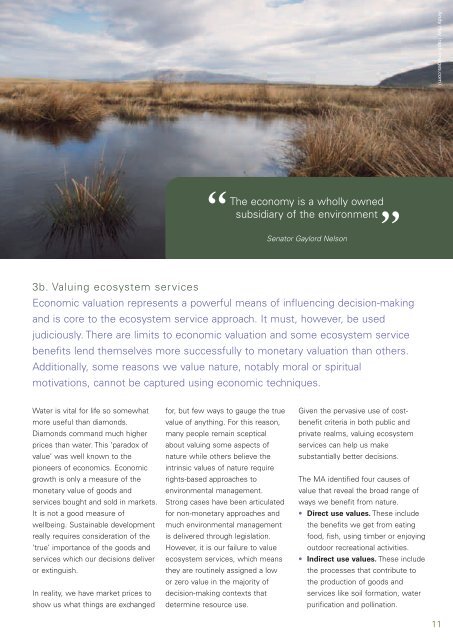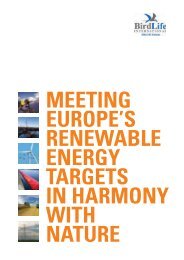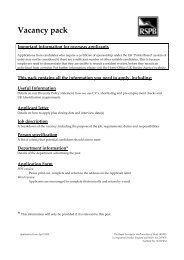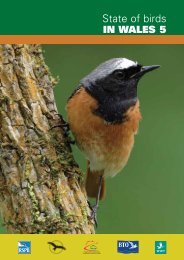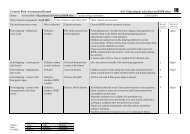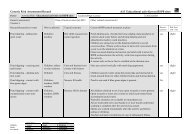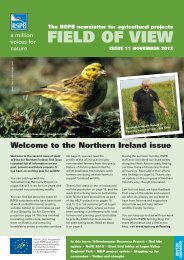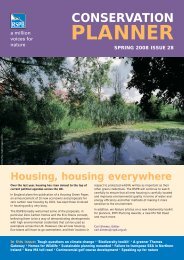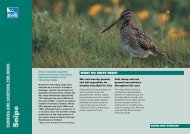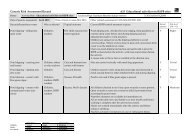Naturally, at your service: - RSPB
Naturally, at your service: - RSPB
Naturally, at your service: - RSPB
You also want an ePaper? Increase the reach of your titles
YUMPU automatically turns print PDFs into web optimized ePapers that Google loves.
Andy Hay (rspb-images.com)<br />
“ ”<br />
The economy is a wholly owned<br />
subsidiary of the environment<br />
Sen<strong>at</strong>or Gaylord Nelson<br />
3b. Valuing ecosystem <strong>service</strong>s<br />
Economic valu<strong>at</strong>ion represents a powerful means of influencing decision-making<br />
and is core to the ecosystem <strong>service</strong> approach. It must, however, be used<br />
judiciously. There are limits to economic valu<strong>at</strong>ion and some ecosystem <strong>service</strong><br />
benefits lend themselves more successfully to monetary valu<strong>at</strong>ion than others.<br />
Additionally, some reasons we value n<strong>at</strong>ure, notably moral or spiritual<br />
motiv<strong>at</strong>ions, cannot be captured using economic techniques.<br />
W<strong>at</strong>er is vital for life so somewh<strong>at</strong><br />
more useful than diamonds.<br />
Diamonds command much higher<br />
prices than w<strong>at</strong>er. This ‘paradox of<br />
value’ was well known to the<br />
pioneers of economics. Economic<br />
growth is only a measure of the<br />
monetary value of goods and<br />
<strong>service</strong>s bought and sold in markets.<br />
It is not a good measure of<br />
wellbeing. Sustainable development<br />
really requires consider<strong>at</strong>ion of the<br />
‘true’ importance of the goods and<br />
<strong>service</strong>s which our decisions deliver<br />
or extinguish.<br />
In reality, we have market prices to<br />
show us wh<strong>at</strong> things are exchanged<br />
for, but few ways to gauge the true<br />
value of anything. For this reason,<br />
many people remain sceptical<br />
about valuing some aspects of<br />
n<strong>at</strong>ure while others believe the<br />
intrinsic values of n<strong>at</strong>ure require<br />
rights-based approaches to<br />
environmental management.<br />
Strong cases have been articul<strong>at</strong>ed<br />
for non-monetary approaches and<br />
much environmental management<br />
is delivered through legisl<strong>at</strong>ion.<br />
However, it is our failure to value<br />
ecosystem <strong>service</strong>s, which means<br />
they are routinely assigned a low<br />
or zero value in the majority of<br />
decision-making contexts th<strong>at</strong><br />
determine resource use.<br />
Given the pervasive use of costbenefit<br />
criteria in both public and<br />
priv<strong>at</strong>e realms, valuing ecosystem<br />
<strong>service</strong>s can help us make<br />
substantially better decisions.<br />
The MA identified four causes of<br />
value th<strong>at</strong> reveal the broad range of<br />
ways we benefit from n<strong>at</strong>ure.<br />
• Direct use values. These include<br />
the benefits we get from e<strong>at</strong>ing<br />
food, fish, using timber or enjoying<br />
outdoor recre<strong>at</strong>ional activities.<br />
• Indirect use values. These include<br />
the processes th<strong>at</strong> contribute to<br />
the production of goods and<br />
<strong>service</strong>s like soil form<strong>at</strong>ion, w<strong>at</strong>er<br />
purific<strong>at</strong>ion and pollin<strong>at</strong>ion.<br />
11


